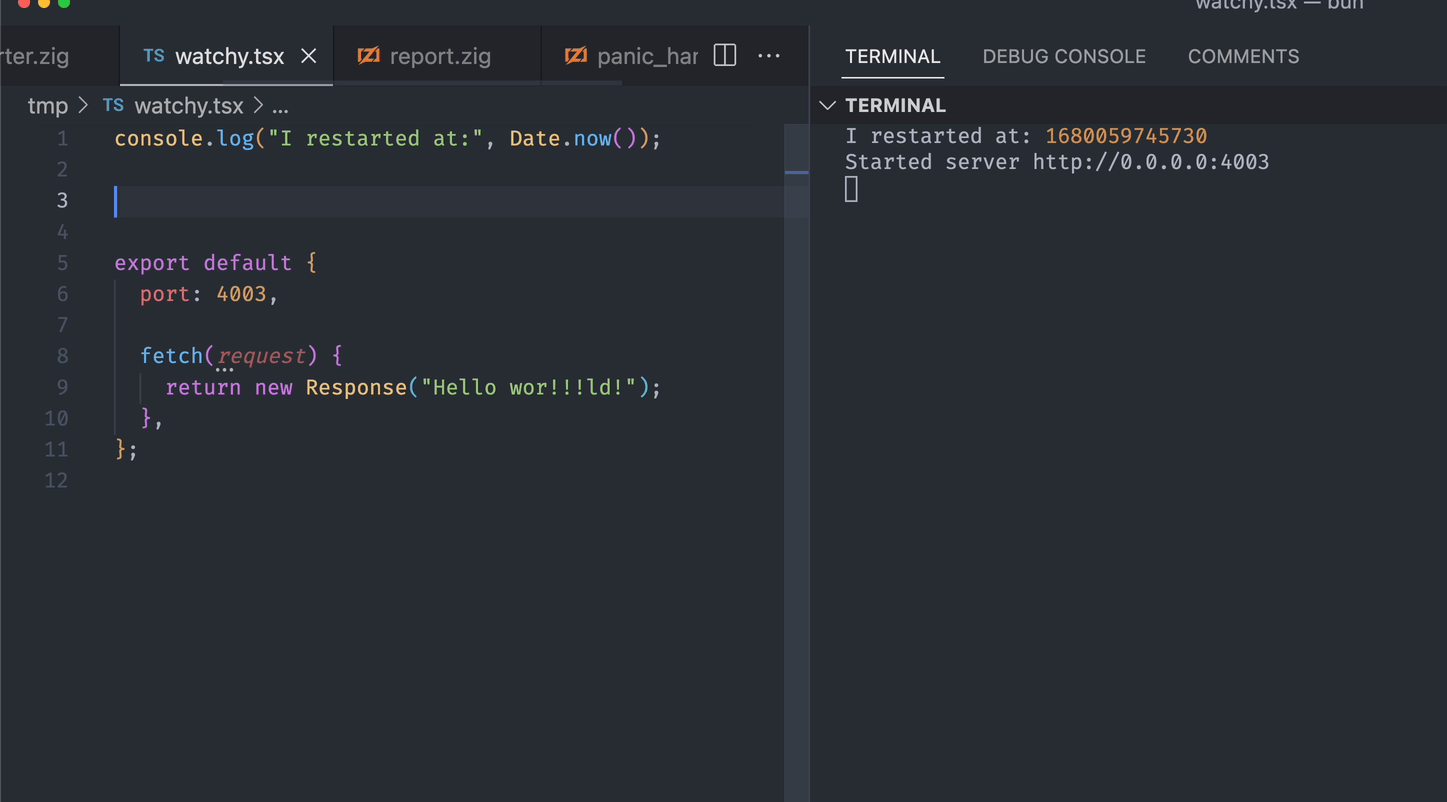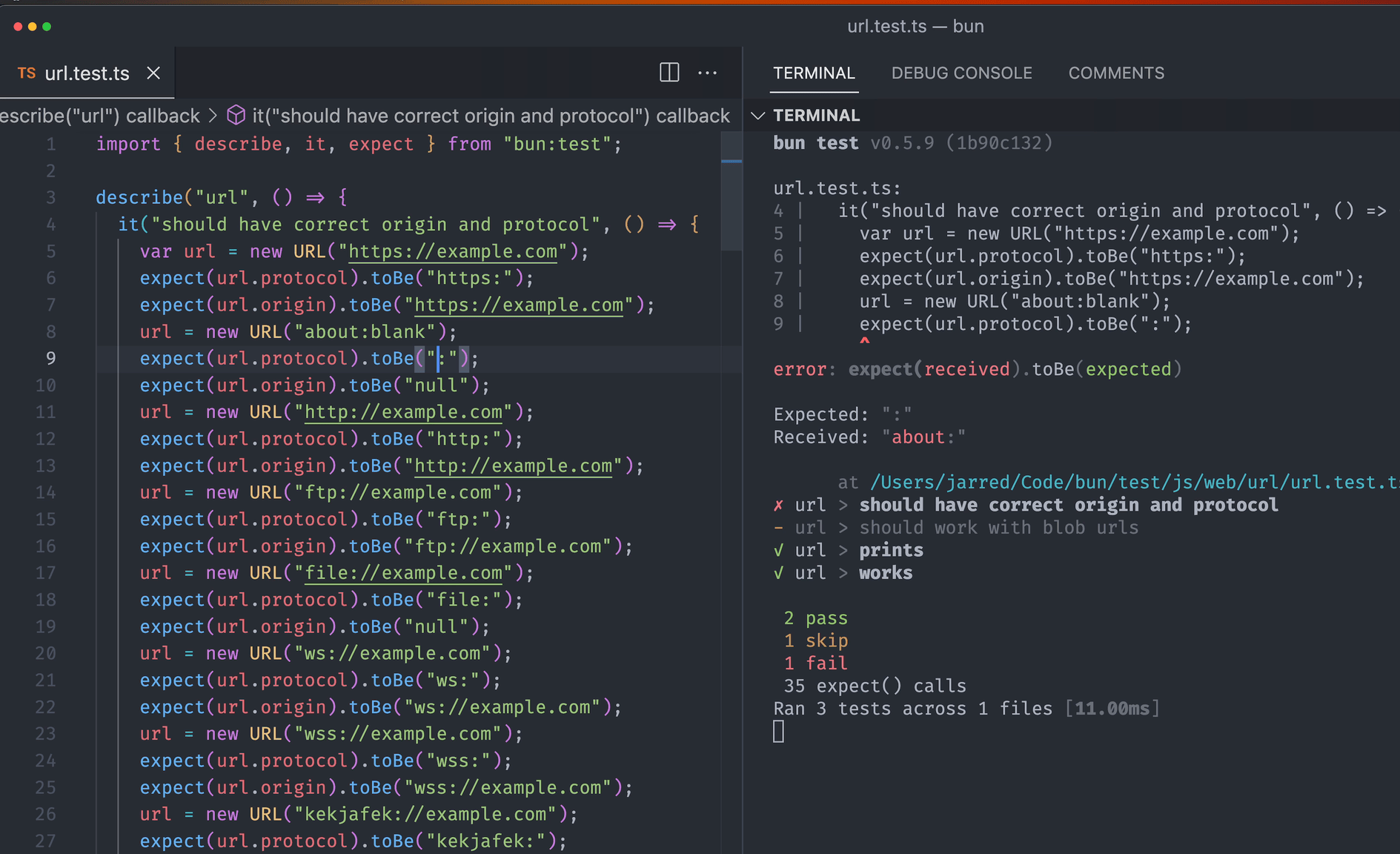--watchmode, which hard restarts Bun’s process when imported files change.--hotmode, which soft reloads the code (without restarting the process) when imported files change.
--watch mode
Watch mode can be used with bun test or when running TypeScript, JSX, and JavaScript files.
To run a file in --watch mode:
terminal
--watch mode:
terminal
--watch mode, Bun keeps track of all imported files and watches them for changes. When a change is detected, Bun restarts the process, preserving the same set of CLI arguments and environment variables used in the initial run. If Bun crashes, --watch will attempt to automatically restart the process.
⚡️ Reloads are fast. The filesystem watchers you’re probably used to have several layers of libraries wrapping the native APIs or worse, rely on polling.Instead, Bun uses operating system native filesystem watcher APIs like kqueue or inotify to detect changes to files. Bun also does a number of optimizations to enable it scale to larger projects (such as setting a high rlimit for file descriptors, statically allocated file path buffers, reuse file descriptors when possible, etc).
terminal

bun test in watch mode and save-on-keypress enabled:
terminal

The
--no-clear-screen flag is useful in scenarios where you don’t want the terminal to clear, such as when
running multiple bun build --watch commands simultaneously using tools like concurrently. Without this flag, the
output of one instance could clear the output of others, potentially hiding errors from one instance beneath the
output of another. The --no-clear-screen flag, similar to TypeScript’s --preserveWatchOutput, prevents this issue.
It can be used in combination with --watch, for example: bun build --watch --no-clear-screen.--hot mode
Use bun --hot to enable hot reloading when executing code with Bun. This is distinct from --watch mode in that Bun does not hard-restart the entire process. Instead, it detects code changes and updates its internal module cache with the new code.
This is not the same as hot reloading in the browser! Many frameworks provide a “hot reloading” experience, where you
can edit & save your frontend code (say, a React component) and see the changes reflected in the browser without
refreshing the page. Bun’s
--hot is the server-side equivalent of this experience. To get hot reloading in the
browser, use a framework like Vite.terminal
server.ts in the example above), Bun builds a registry of all imported source files (excluding those in node_modules) and watches them for changes. When a change is detected, Bun performs a “soft reload”. All files are re-evaluated, but all global state (notably, the globalThis object) is persisted.
bun --hot server.ts, you’ll see the reload count increment every time you save the file.
terminal
nodemon restart the entire process, so HTTP servers and other stateful objects are lost. By contrast, bun --hot is able to reflect the updated code without restarting the process.
HTTP servers
This makes it possible, for instance, to update your HTTP request handler without shutting down the server itself. When you save the file, your HTTP server will be reloaded with the updated code without the process being restarted. This results in seriously fast refresh speeds.Note — In a future version of Bun, support for Vite’s
import.meta.hot is planned to enable better lifecycle management for hot reloading and to align with the ecosystem.Implementation details
Implementation details
On hot reload, Bun:
- Resets the internal
requirecache and ES module registry (Loader.registry) - Runs the garbage collector synchronously (to minimize memory leaks, at the cost of runtime performance)
- Re-transpiles all of your code from scratch (including sourcemaps)
- Re-evaluates the code with JavaScriptCore